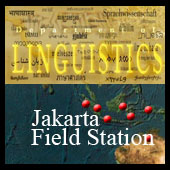| (The Former) Jakarta Field Station of the Max Planck Institute for Evolutionary Anthropology | |
 | |
| Data | |
| Projects | |
| Language Acquisition | |
| Bilingual Language Acquisition | |
| Language Contact | |
| Language Description | |
| Language Experiments | |
| Javanese Dialectology | |
| Metaphor and Emotion | |
| Collaborative Projects | |
| Documentation of Kenyah | |
| Figurative Language | |
| Language and Thought | |
| Phon. of Jakarta Indonesian | |
| Traditional Jambi Malay | |
| Moluccan [external link] | |
| Acquisition of Passive Voice | |
| Sociolinguistic Questionnaire | |
| Former Collaborative Projects | |
| Acq. of Morpho-phonology | |
| Publications & Conf. Papers | |
| News | |
| Regular Events | |
| Events | |
| The Jakarta Forum | |
| Contact Us | |
| People | |
| Site Map | |
| Links | |
| Impressum | |
Language and Thought: Universality and Relativism
Outside Scientists:
Lera Boroditsky [external link] (Stanford University)
Michael Ramscar (Stanford University)
MPI Scientist:
David Gil
Local Assistants:
Febby Meilissa
Tessa Yuditha
Funding:
Searle Scholars Foundation
NSF Program on Perception and Cognition
Surdna Foundation
Class of 1942 Career Development Grant
Almost anybody who has taken part in interactions between native English speakers and Indonesian speakers has had occasion to observe striking differences in how people from both groups deal with the notion of time: how they conceive time, how they value time, and how they plan and execute their activities in time. Alongside these, English speakers and Indonesian speakers also talk about time differently: whereas in English the expression of time is an inseparable and inextricable part of the structure of each and every sentence via the obligatory encoding of grammatical categories such as tense and aspect, in Indonesian the expression of time is optional and only weakly if at all grammaticalized. This leads one to wonder whether the way English speakers and Indonesian speakers think about time is related to the way time is encoded in our respective languages, and, if it is, which comes first: does the way we think about time affect how we talk about it, or does the way time is encoded in our grammars determine how we think about it?
In this project, we plan to study a variety of conceptual categories which are encoded in significantly different fashion in English and in Indonesian. In general, one may distinguish between the following three cases: (a) categories which are expressed with greater specificity in English than Indonesian; (b) categories which are expressed with roughly the same degree of specificity in the two languages; and (c) categories which are expressed with greater specificity in Indonesian. Some of the categories which we plan to study include, in addition to time, also number, gender, age, thematic roles, spatial relations, size, shape and colour.
For each such conceptual category, the study involves the following stages: (a) determining how the category is expressed in the grammars and the lexicons of the respective languages, using usual descriptive methods supplemented by psycholinguistic experiments; (b) exploring the ways in which speakers of the respective languages conceptualize the category, as measured through similarity ratings, groupings, memory performance, attentional behavior, reasoning, and other cognitive tasks; (c) examining the resulting linguistic and cognitive facts for possible correlations; (d) examining whether specific aspects of linguistic experience can affect cognition by tracking cognitive changes that take place as children acquire specific aspects of their first language, or as bilingual adults acquire a second language either naturally or as part of a controlled training study in the laboratory; and (e) expanding the empirical coverage to other languages.
Comparative experimental studies already conducted in the domain of time have shown that, indeed, speakers of English and of Indonesian differ substantially in their cognitive representations of time. Certain grammatical aspects of English appear to create and draw attention to temporal categories in the structure of events that are not salient to Indonesian speakers who have not learned English or to children acquiring English as their first language who have not yet mastered the meaning of English temporal grammar.
For a description of some of the experiments that are run in this project, click here.
Last modified: 10 Apr 2007, London, UK
Location: thought.php.html